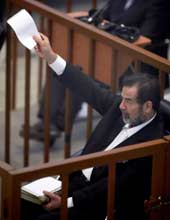
Former Iraqi leader Saddam Hussein raises his hand to
pass a note to the judge as he listens to prosecutors' statements during his
genocide trial in Baghdad, yesterday. -Xinhua/Reuters
The trial of ousted Iraqi leader Saddam Hussein and six of his aides believed
to be involved in crimes against Kurdish population in the 1980s resumed in
Baghdad yesterday.
The 20th session began with hearing a witness who preferred to testify from
behind a curtain to tell the Iraqi High Tribunal mass killings of prisoners.
The witness said that he and his brothers had been arrested in the Tob Zawa
detention in Kirkuk before they were taken to another detention in Iraq's
western desert of Anbar province.
In western desert, brutal guards in green uniform took dozens of blindfolded
prisoners to shoot at them before throwing them into a ditch, he said.
"The guards then jumped down into the ditch and started shooting at those who
were still alive," he said. "One of those killed was my cousin, whose name is
Saleh Amin Ahmed."
"I managed to run away, when the guard was absent," he said, adding his five
brothers were also executed in western Iraq.
The witness made his complaints against Saddam, his cousin Ali Hassan
al-Majid and all those involved in the Operation Anfal, but he rejected
compensation saying "all the money of the world would not bring my five brothers
back."
The second witness, who also spoke anonymously, told the court an almost the
same story about the mass killing of Kurdish detainees.
The third witness, 46-year-old Kurd housewife Nasrin Fattah Ahmed, said that
in 1988, she was blinded by poison gas and many people were killed, including
her son and husband when warplanes attacked her village.
She said she received treatment and regained sight in one eye. Two more
witnesses also testified in Tuesday's session, saying they survived mass
executions in Iraq's western desert of Ramadi in Anbar province.
Chief Judge Muhammad Ureiybi then ordered the court to be adjourned until
Nov. 7.
Saddam and his codefendants are facing charge of genocide for their role in
Anfal campaign against Iraq's Kurds in the 1980s, in which some 182,000 people
were allegedly killed or missing.



